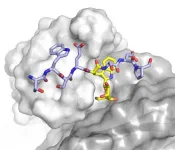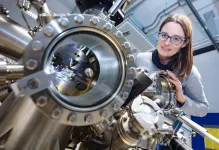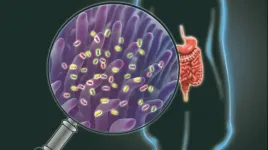Clinical trial: Using MRI for prostate cancer diagnosis equals or beats current standard
Phase III clinical trial of men with a clinical suspicion of prostate cancer finds MRI with targeted biopsies to be more accurate at diagnosis and less intrusive than current standard
2021-02-04
(Press-News.org) Toronto - (February 4, 2021) The results of a Phase III randomized clinical trial have shown that when it comes to detecting clinically significant prostate cancer, Magnetic Resonance Imaging (MRI) with targeted biopsies (MRI-TBx) matches the current standard and brings a multitude of advantages. The PRostate Evaluation for Clinically Important Disease: MRI vs Standard Evaluation Procedures (PRECISE) study will help to make prostate cancer diagnosis more accurate and less invasive.
PRECISE included 453 participants at Canadian academic cancer centres who were either assigned to receive MRI imaging followed by MRI-TBx of suspicious areas (identified by MRI), or the current standard of care of a systematic 12-core transrectal ultrasound-guided (TRUS) biopsy (TRUS-Bx).
Key findings:
MRI with targeted biopsy found five per cent more clinically significant prostate cancers compared to those receiving systematic TRUS-Bx biopsies, conclusively demonstrating the method can at least match the performance of the current standard of care.
Compared to standard TRUS-Bx, the MRI-TBx were found to be better in identifying clinically significant cancers.
More than a third of patients in the MRI arm of the trial avoided biopsies altogether following negative imaging results. Those individuals received a follow-up MRI in two years' time.
Those who did have biopsies in the MRI arm had significantly fewer samples taken when compared to systematic TRUS-Bx, resulting in less pain and discomfort for patients. Moreover, the MRI arm had a decreased adverse event profile, including less hematuria (blood in the urine) and incontinence.
There is a major unmet need for a test that identifies clinically significant prostate cancer while avoiding overdiagnosing clinically insignificant cancers. Use of MRI reduced the unnecessary diagnosis of slow growing, clinically insignificant prostate cancers by 55 per cent.
These findings show decisively that MRI together with targeted biopsies offer patients a less invasive procedure, the chance to avoid a biopsy all together and can help avoid the over-treatment of clinically insignificant prostate cancer - all while detecting a higher rate of clinically significant cancers.
"My colleagues and I are thrilled about these results that show, without a doubt, that imaging and targeted biopsies are the future of prostate cancer diagnosis. We can catch more of the cancers we should be treating, avoid unnecessary treatment at the same time and improve the quality of life for our patients." says Dr. Laurence Klotz, Chair of Prostate Cancer Research at Sunnybrook Health Sciences Centre and lead author of the study. "We thank the study participants and our funders for their support and look forward to continuing our efforts to have this technology used more widely."
"I congratulate Dr. Klotz and the PRECISE team on this truly impactful research which will change clinical care and make a difference for men with prostate cancer," says Dr. Christine Williams, Deputy Director and Head, Clinical Translation at the Ontario Institute for Cancer Research. "It is a great example of how, with our partners, we are moving research innovations to the clinic to improve the lives of patients and treat cancer with improved precision."
"These practice-changing results will have a significant and positive impact on the roughly 64 Canadians who are diagnosed with prostate cancer every day. Thanks to the efforts of Dr. Klotz and his team, people will need to undergo fewer biopsies and for some of them, they will be spared from unnecessary biopsies and treatments altogether," says Dr. Stuart Edmonds, Executive Vice President, Mission, Research and Advocacy at the Canadian Cancer Society. "We are proud to support this research, which will help people with prostate cancer live longer, fuller lives."
"At Movember, we are honoured to play a role in funding cutting-edge research like the PRECISE study, ultimately helping to provide more positive outcomes for men living with or beyond a prostate cancer diagnosis," says Todd Minerson, Country Director for Movember Canada.
INFORMATION:
PRECISE was funded by the Canadian Cancer Society with funds provided by Movember and by the Ontario Institute for Cancer Research.
About the Ontario Institute for Cancer Research
OICR is a collaborative, not-for-profit research institute funded by the Government of Ontario. We conduct and enable high-impact translational cancer research to accelerate the development of discoveries for patients around the world while maximizing the economic benefit of this research for the people of Ontario. For more information visit http://www.oicr.on.ca.
About the Canadian Cancer Society
The Canadian Cancer Society (CCS) is the only national charity that supports Canadians with all cancers in communities across the country. No other organization does what we do; we are the voice for Canadians who care about cancer. We fund groundbreaking research, provide a support system for all those affected by cancer and shape health policies to prevent cancer and support those living with the disease.
Help us make a difference. Call 1-888-939-3333 or visit cancer.ca today.
About Movember
Movember is the leading charity changing the face of men's health on a global scale, focusing on mental health and suicide prevention, prostate cancer and testicular cancer. The charity raises funds to deliver innovative, breakthrough research and support programs that enable men to live happier, healthier and longer lives. Committed to disrupting the status quo, millions have joined the movement, helping fund over 1,250 projects around the world. In addition to tackling key health issues faced by men, Movember is working to encourage men to stay healthy in all areas of their life, with a focus on men staying socially connected, and becoming more open to discussing their health and significant moments in their lives. The charity's vision is to have an everlasting impact on the face of men's health. To donate or learn more, please visit Movember.com.
ELSE PRESS RELEASES FROM THIS DATE:
2021-02-04
What The Study Did: Researchers estimated the rate of nurse burnout in the United States and the factors associated with leaving or considering leaving their jobs due to burnout.
Authors: Megha K. Shah, M.D., M.Sc., of the Emory University School of Medicine in Atlanta, is the corresponding author.
To access the embargoed study: Visit our For The Media website at this link https://media.jamanetwork.com/
(doi:10.1001/jamanetworkopen.2020.36469)
Editor's Note: The article includes conflict of interest and funding/support disclosures. Please see the article for additional information, ...
2021-02-04
What The Study Did: Researchers in this randomized clinical trial investigated whether nasopharyngeal application of povidone iodine could reduce the viral load of patients with nonsevere COVID-19 symptoms.
Authors: Olivier Mimoz, M.D., Ph.D., University Hospital of Poitiers in Poitiers, France, is the corresponding author.
To access the embargoed study: Visit our For The Media website at this link https://media.jamanetwork.com/
(doi:10.1001/jamaoto.2020.5490)
Editor's Note: The article includes conflict of interest and funding/support disclosures. Please see the article for additional information, including other authors, author contributions and affiliations, conflict of interest and financial disclosures, ...
2021-02-04
What The Study Did: This randomized clinical trial looked at changes in levels of the hormone estradiol in men with hormone receptor-positive breast cancer after three months of treatment with endocrine therapies.
Authors: Sibylle Loibl, M.D., Ph.D., of the German Breast Group in Neu-Isenburg, Germany, is the corresponding author.
To access the embargoed study: Visit our For The Media website at this link https://media.jamanetwork.com/
(doi:10.1001/jamaoncol.2020.7442)
Editor's Note: The article includes conflicts of interest and funding/support disclosures. Please see the article ...
2021-02-04
CAMBRIDGE, MA -- Cryo-electron microscopy (cryo-EM) allows scientists to produce high-resolution, three-dimensional images of tiny molecules such as proteins. This technique works best for imaging proteins that exist in only one conformation, but MIT researchers have now developed a machine-learning algorithm that helps them identify multiple possible structures that a protein can take.
Unlike AI techniques that aim to predict protein structure from sequence data alone, protein structure can also be experimentally determined using cryo-EM, which produces hundreds of thousands, or even millions, of two-dimensional images of protein samples frozen in a thin layer of ice. Computer algorithms then piece together these images, taken from different angles, into a three-dimensional ...
2021-02-04
The next time you tuck in to a tikka masala you might find yourself asking a burning question: are spices used in dishes to help stop infection?
It's a question many have chewed the fat over. And now thanks to new research from The Australian National University (ANU) we have an answer.
The quick takeaway is: probably not.
Professor Lindell Bromham and her colleagues asked why hot countries across the world tend to have spicy food? This pattern has led to what some have termed "Darwinian gastronomy" - a tummy-led cultural evolutionary process in countries with hotter climates.
To find out the answer to their question, the researchers feasted on a true ...
2021-02-04
You might remember you ate cereal for breakfast but forget the color of the bowl. Or recall watching your partner put the milk away but can't remember on which shelf.
A new Northwestern Medicine study improved memory of complex, realistic events similar to these by applying transcranial magnetic stimulation (TMS) to the brain network responsible for memory. The authors then had participants watch videos of realistic activities to measure how memory works during everyday tasks. The findings prove it is possible to measure and manipulate realistic types of memory.
"On a day-to-day basis we must remember complex events that involve many elements, such as different locations, people and objects," said lead author Melissa Hebscher, a postdoctoral fellow ...
2021-02-04
New tools and methods have been described by WEHI researchers to study an unusual protein modification and gain fresh insights into its roles in human health and disease.
The study - about how certain sugars modify proteins - was published today in Nature Chemical Biology. Led by WEHI researcher Associate Professor Ethan Goddard-Borger, this work lays a foundation for better understanding diseases like muscular dystrophy and cancer.
At a glance
WEHI researchers have developed new tools and methods to determine how 'tryptophan C-mannosylation', an unusual protein modification, impacts the stability and function ...
2021-02-04
In order to produce tiny electronic memories or sensors in future, it is essential to be able to arrange individual metal atoms on an insulating layer. Scientists at Bielefeld University's Faculty of Chemistry have now demonstrated that this is possible at room temperature: molecules of the metal-containing compound molybdenum acetate form an ordered structure on the insulator calcite without jumping to other positions or rotating. Their findings have been presented in the Nature Communications journal. The work was done in cooperation with researchers from the universities of Kaiserslautern, Lincoln (UK) and Mainz.
'Until now, it has been difficult ...
2021-02-04
A healthy person has a general balance of good and bad bacteria. But that balance is thrown off when someone gets sick. So, to help boost their levels of good bacteria, many people take probiotic supplements -- live bacteria inside of a pill. Various commercial probiotic supplements are available for consumer purchase, and while health experts generally agree about their overall safety, controversy surrounds their efficacy.
Inside the human body lives a large microscopic community called the microbiome, where trillions of bacteria engage in a constant "tug of war" to maintain optimal levels of good and bad bacteria. Most of this struggle takes place within the body's gastrointestinal tract, as bacteria help with digesting food and support the immune system. Although ...
2021-02-04
New research carried out by City data scientist, Dr Andrea Baronchelli, and colleagues, into the dark web marketplace (DWM) trade in products related to COVID-19, has revealed the need for the continuous monitoring of dark web marketplaces (DWMs), especially in light of the current shortage and availability of coronavirus vaccines.
In their paper, Dark Web Marketplaces and COVID-19: before the vaccine published in the EPJ Data Science journal, Dr Baronchelli and his colleagues analysed 851,199 listings extracted from 30 DWMs between January 1, 2020 and November 16, 2020 before the advent of the availability of the coronavirus vaccine.
They identify 788 listings directly related to COVID-19 products and monitor the temporal evolution of product categories including Personal Protective ...
LAST 30 PRESS RELEASES:
[Press-News.org] Clinical trial: Using MRI for prostate cancer diagnosis equals or beats current standard
Phase III clinical trial of men with a clinical suspicion of prostate cancer finds MRI with targeted biopsies to be more accurate at diagnosis and less intrusive than current standard



